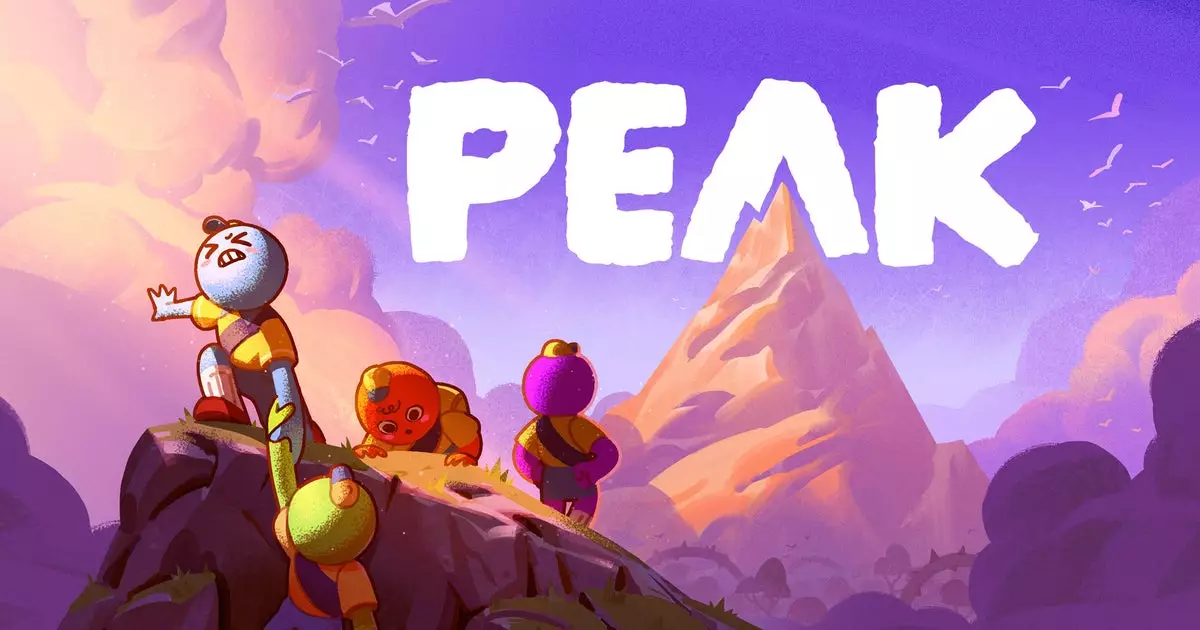The creation of Peak, a delightful co-op video game designed for exhilarating mountain climbs with friends, is a fascinating narrative that intertwines elements of competition, teamwork, and an unexpected spark of jealousy. This game is not just a trending term among adolescents to signify excellence but is instead a thoughtful product arising from a unique collaborative effort between two indie game developers, Aggro Crab and Landfall. Their partnership was forged during a month-long game jam, which has become a prominent platform for innovation within the gaming industry.
In a revealing interview with PC Gamer, Nick Kaman, lead of Aggro Crab, humorously attributed the game’s inception to feelings of jealousy that emerged when the team learned about the commercial success of Landfall’s previous game, Content Warning. Kaman’s anecdote serves as a reminder of how emotions, particularly competitive ones, can spur creative output when channeled effectively. The irony here is palpable: while jealousy typically has negative connotations, for Kaman and his team, it acted as a catalyst that propelled them into an environment of collective creativity and innovation.
Transformative Experiences and the Power of Collaboration
As Aggro Crab was navigating the noise and stress associated with launching their own ambitious project, Another Crab’s Treasure, their industry horizon widened when they were invited to join Landfall in Korea for the game jam. This experience underlines the significant advantages of collaboration in the gaming world—the idea that developers can achieve greater feats when they bring disparate talents and backgrounds together in a single creative endeavor.
Upon arriving in Korea, the team from Aggro Crab quickly immersed themselves in the local scene, even dedicating their initial hours to assembling office furniture that would benefit the indie gaming community after their departure. This act of giving back reflects the spirit of collaboration and support that often permeates indie development circles. The setup not only bolstered their physical workspace but also showcased a willingness to actively engage with the gaming community beyond their own project. It was as if the blending of ideas—their own motivation intertwined with the cultural richness of their surroundings—was the perfect recipe for success.
Creative Ideation: From the Hot Tub to the Himalayas
Interestingly, the genesis of Peak predates the game jam experience. The game’s concept originated the previous year in a rather unusual setting—a hot tub in Sweden. This moment of inspiration reveals a vital truth about creativity: innovative ideas can emerge from the most unexpected places, adding a human element that resonates profoundly within the gaming community. Initially envisioned as a vague survival game, the idea quickly morphed as each team member’s enthusiasm ignited, paving the way for the robust concept of a team of lost scouts navigating precarious mountaintops.
The transformation from concept to execution during the month spent in Korea was nothing short of exhilarating. Kaman remarked on the intensity of work but emphasized it as among the most enjoyable experiences he has had in game development. Such joy highlights an important factor often overlooked—the emotional investment that developers have in their projects often translates to the player’s experience.
Quality Over Speed: A Double-Edged Sword
Despite Peak launchings into commercial success, it’s essential to approach this success story critically. The assumption that a good game can be produced quickly is misleading and serves as a cautionary tale for aspiring developers. Both Aggro Crab and Landfall are seasoned developers with a wealth of experience that informs their creative processes. Their ability to produce such a compelling game in a short time is not merely indicative of their efficiency but rather a testament to their expertise and established teamwork.
Newcomers to the game development scene should recognize that while there may be lessons to glean from the rapid birth of Peak, real artistry in game development often requires nurturing ideas over time, commitment to iterative processes, and the intricacies of refining concepts before bringing them to life. Quality gaming experiences are rarely the result of hasty productions borne from envy but are often the culmination of passion, perseverance, and collaborative spirit.

